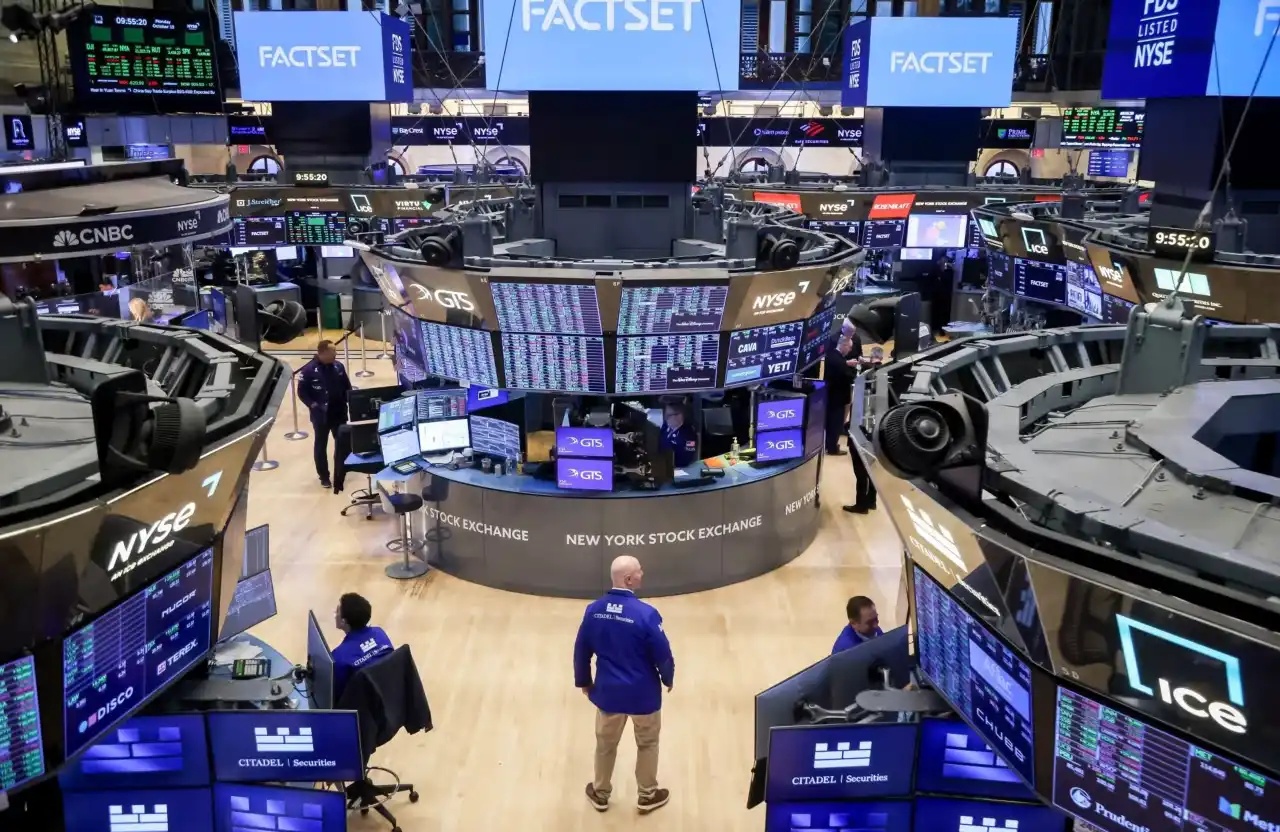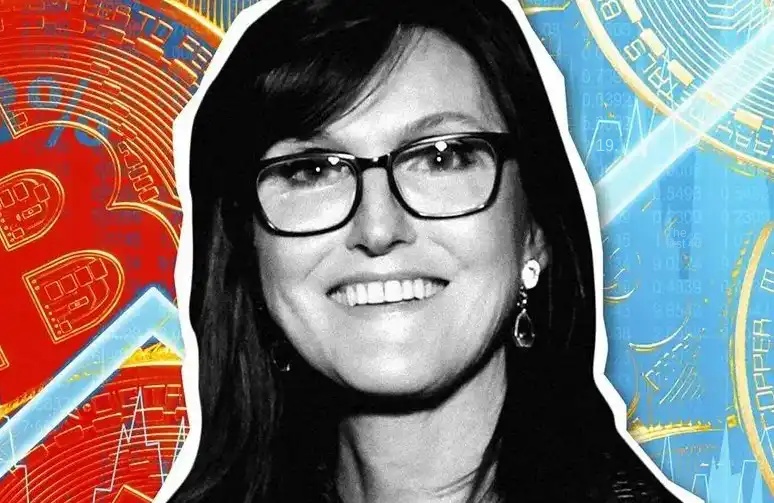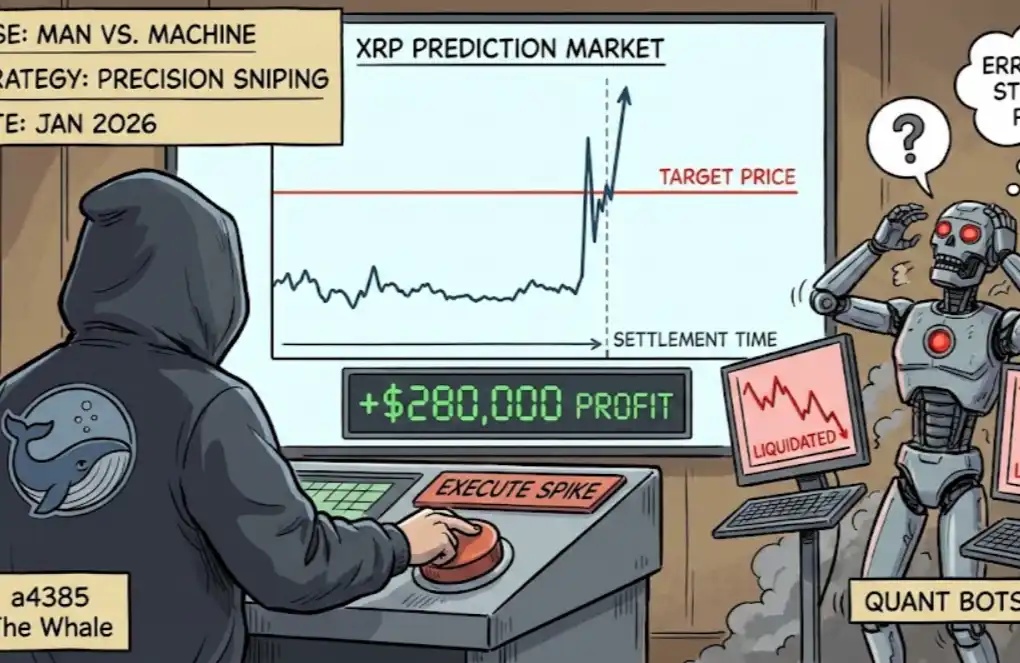180 Days Before Zhao Changpeng's Pardon
In the middle of the night on October 23, 2025, Chinese crypto tycoon Zhao Changpeng was announced to have received a presidential pardon from the United States' Trump.
According to public information, President Trump had previously expressed sympathy for Zhao Changpeng, stating that he believed Zhao was facing "political persecution in the United States."
However, just a year before, on April 30, 2024, Zhao Changpeng was going through the darkest moment of his life: he was stripped naked, subjected to a humiliating body search, forced to show his buttocks, and then locked in a cold cell. His cellmates were burly men with tattoos all over their faces and bodies.
In a federal court in Seattle, Zhao Changpeng, dressed in a prison uniform, confessed to his crimes. This man known as the "Chinese crypto tycoon" voluntarily agreed to pay a $4.3 billion fine and, in front of the media, said, "I am choosing to proactively pay a political fine."
If someone had told him at that time: a year later, you will not only be pardoned by the United States but also be able to set foot in China again, and all the cold stares and punches in the Seattle cell, along with that $4.3 billion political fine, will be reset to zero. He would probably curse and say, what kind of dark humor is this.
The signal of Zhao Changpeng's pardon started to emerge on September 17, 2025. On that day, CZ suddenly updated his Twitter profile, changing "ex-@binance" back to "@binance." To some extent, this indicated that he could return to the dust of Binance.
At the same time, in October, the two major "compliant trading gateways" in the United States almost simultaneously signaled: the crypto listing platform Coinbase and the SEC-regulated mainstream broker Robinhood successively opened BNB trading, the native token of the Binance ecosystem founded by Zhao Changpeng, officially gaining access to the U.S. mainstream financial system for the first time.
White House Press Secretary Karoline Leavitt announced the pardon's effect, emphasizing, "The Biden administration's war on cryptocurrency comes to an end."
Let's turn the clock back 180 days before the pardon. When the Chinese crypto tycoon and Binance founder Zhao Changpeng was on the brink of a "political pardon," what was he doing?
01.
In the spring of 2025, a hint of long-lost liveliness filled the air in Victoria Harbour as a group photo quickly went viral.
Standing in the center of the photo were four individuals: Huobi founder Li Lin, Zhao Changpeng CZ, Justin Sun, and Kong Jianping.

Group Photo featuring Li Lin, Co-Founder of Huobi, positioned at the left nine, Changpeng Zhao (CZ), Founder of Binance, positioned at the left ten, and Kong Jianping, positioned at the left six
To outsiders, this is just a group photo of several big shots in the crypto industry. However, to those in the know, this scene itself is a signal.
Eight years ago, China completely banned ICOs and cryptocurrency exchanges. Binance hurriedly went overseas, and Changpeng Zhao became the "least likely to return to China." Eight years later, he reappeared in this group photo. This marked his reintroduction to local capital and institutions.
The host of this gathering, Li Lin, the founder of Huobi, once one of the world's top three exchanges, sold the exchange he personally created to Sun Yuchen three years ago during the same dinner event. After the dinner, the person most connected to CZ was the one standing beside them, Kong Jianping.
Kong Jianping was formerly the Co-Chairman of the Board of Directors of the well-known mining machine manufacturer Canaan Technology. In 2020, he founded Nano Labs and served as Chairman, as well as a Director of Hong Kong Cyberport and a member of the Hong Kong "Web3 Development Promotion Working Group." He was even appointed by the Financial Secretary and Treasury to serve as a member of the board of the tribunal [2].
Two months after this gathering, Kong Jianping made a high-profile announcement to create a $1 billion BNB Treasury, aiming to acquire 5%-10% of the circulating supply and package Binance Coin (BNB) into a "US-listed company".
CZ personally retweeted this on Twitter, instantly igniting market sentiment. The stock price surged all the way, with an intraday increase of up to 107%+. Changpeng Zhao emphasized that he and his affiliated entities "did not participate in this round of financing." However, they "still very much support it."
Subsequently, behind most of Changpeng Zhao's public speaking engagements in Hong Kong, Kong Jianping's presence could be observed.

Four months later, when Changpeng Zhao returned to Hong Kong for the second time, he was no longer just a "mysterious guest" at Binance events but arrived with a clear agenda: on one hand, he officially announced a partnership with Matrixport before the event; on the other hand, he finalized integration with OSL after the event. The before-and-after coherence marked his gradually clear landing path in Hong Kong.
The story of Matrixport shares many similarities with Binance, both shining brightly while remaining un-anchored. Founder Daniel Yan was originally one of the most influential figures in the investment banking circles, facilitating mega-mergers such as Didi Chuxing and Kuaidi Dache, Meituan and Dianping, and investing in the largest stablecoin company Circle.
In February 2023, Bao Fan suddenly "disappeared," causing Huaxing to become a sensitive name in the capital market. The investment banking business continued to operate but was in a state of limbo due to the founder's "detention": traditional finance did not dare to fully trust it, and emerging internet capital felt that its days were numbered.
At the end of August 2025, Binance officially announced a partnership with Huaxing Capital.
Prior to the partnership between Huaxing Capital and BNB being finalized, a subtle coincidence occurred. On August 8, 2025, Caixin revealed that Huaxing's founder Bao Fan had been "released," ending a two-and-a-half-year investigation into his disappearance. Just three weeks later, Huaxing announced a $1 billion investment in BNB and joined hands with Zhao Changpeng's family fund YZi Labs to launch a compliance fund. Bao Fan's wife, Xu Yanqing, who is also the current Chairwoman of the Huaxing board, participated as a guest speaker at BNB's Eco Fifth Anniversary event.
In addition, Zhao Changpeng and Huaxing also implemented a seemingly inconspicuous move: they will facilitate BNB's compliant listing on a licensed virtual asset exchange platform regulated by the Hong Kong Securities and Futures Commission.

Just 12 days later, OSL, as the first licensed exchange platform in Hong Kong, announced the listing of Binance Coin (BNB), making it the fifth cryptocurrency approved for trading on a licensed exchange platform in Hong Kong.
As the first licensed trading platform in Hong Kong, OSL is backed by its parent company BC Technology, a licensed fintech group listed on the Hong Kong Stock Exchange. OSL itself obtained the first batch of licenses for virtual asset exchange platforms in Hong Kong and combines custody and brokerage services, with a network directly connecting local brokers, ETF custodians, and institutional distributors.
The company is considered unique in the industry due to its early management team's "financial background." Its largest shareholder, holding 25.43% of the shares, originally came from a traditional brokerage background, later entered the crypto space, and was also the founder of the trading platform Bitget, blending compliance with the capital market most thoroughly.
Zhao Changpeng's return is intertwined with these coincidences and operations, piecing together the puzzle with blocks of capital and politics.
In the 180 days leading up to his pardon, Zhao Changpeng's seemingly scattered actions were all actually serving the same goal: first, to rebuild CZ's legitimacy in returning to China.
02.
During an event at the University of Hong Kong, Zhao Changpeng said, "Four years ago when I left the mainland, I thought I would never return to the core stage of the Chinese-speaking world. But today, standing in Hong Kong, I clearly understand that my previous drift was just a prelude, and the real story is just beginning."
Some people think it's just a formality, but once you know the story behind it, you'll realize that it may be heartfelt.
In July 2017, Binance started in Shanghai. Two months later, domestic regulation completely banned ICOs and trading platforms, forcing CZ to evacuate with a team of over thirty people. Within six weeks, they moved their data from Aliyun to AWS, obtained visas for engineers who had never traveled abroad, and, like a makeshift expedition team, arrived in Tokyo.
At that time, Japan seemed like an ideal safe haven, with the government already recognizing virtual currencies as legal. So Binance rented an office, and with about a dozen people, it became the "global headquarters."
The bull market of 2017 was raging, with Bitcoin surging from $3,000 to $19,000. Binance quickly rose to the top of global trading volume within just five months. During that time, they hardly slept as the registration volume skyrocketed to the point of having to temporarily halt new accounts.
But the winds soon shifted. In early 2018, scammers used fake Google ads for phishing and stole investors' Binance accounts and funds. The Japanese Financial Services Agency suddenly tightened its policies and in March directly warned Binance about its unlicensed operations in Japan. The cold shoulder from regulators was more terrifying than hackers, so CZ once again packed up and left Tokyo.
Following the retreat from Tokyo, CZ placed his bet on the Mediterranean island of Malta. In 2018, Prime Minister Muscat proclaimed the slogan "Blockchain Island." Zhao Changpeng collaborated with the local government to establish a presence there, declaring Binance's global headquarters to be located there. Within three months, the team expanded to include employees from 39 countries. However, two years later, the Malta Financial Services Authority delivered a cold statement: Binance was never registered.
With Japan's skepticism and Malta's reversal, CZ was forced to announce outright that Binance would no longer seek a headquarters.
In September 2021, this "headquarters-less model" began to play a special role in regulation. In 2021, a trading platform competitor sued Binance in the United States, leading to a class-action lawsuit against Binance, CoinMarketCap, and Zhao Changpeng.
Here comes the interesting part: a subpoena can find a company, but with "no headquarters," there is no address to find, so they ultimately had to go after the founder. Consequently, the plaintiffs' attorney hired a retired Marine Corps private detective to track down CZ. The investigation spanned across Asia, Europe, and the Middle East, scouring flight data, business registrations, and social media. After several months, they still had nothing.
It wasn't until the detective finally left a line in the report: "We made great efforts to track down Zhao Changpeng, but Zhao Changpeng's whereabouts are almost untraceable."
Even the lawyer eventually suggested serving the subpoena directly through Twitter, considering CZ speaks out on it every day. Of course, this was rejected by the judge.
Drifting was just the prelude; headquarters can disappear, passports can be changed. But soon, Changpeng Zhao would face another more challenging identity question—when Americans point the spearhead at his Chinese heritage, what answer can Changpeng Zhao give?
03.
At the poker table of world power games, what is revealed first is one's origin, followed by the display of a passport. As for ability, it often only serves as the final talking point.
From walking out of a U.S. prison to receiving a presidential pardon, on this journey, Changpeng Zhao's dedication to "compliance" has always been "more than just" compliance.
By the end of 2022, the second-largest U.S. trading platform, FTX, collapsed, creating a huge capital gap due to losses. Seven months later, the U.S. SEC began to sue Binance's CZ for illegal operations, eventually issuing a record $43 billion fine by the end of the year.
Outside the courtroom, Washington's power game never ceased. Led by the Democratic Party, a regulatory storm molded CZ into the perfect target: a Chinese entrepreneur who controlled half of the cryptocurrency world, accused of violating anti-money laundering and sanction regulations. In the prosecutor's indictment, Binance was accused of "serving illegal activities," and CZ's background—born in China, with an early life in Shanghai as a Chinese individual—became the cheapest and most effective point of attack.
On November 24, 2023, a trending post on the overseas social media platform Reddit soared to the top of the cryptocurrency section, discussing whether Binance could truly bear the $43 billion fine and comparing it to FTX's $68 billion hole. Many American netizens even hinted: the government is "squeezing blood" from Binance to fill the void in the U.S. cryptocurrency industry.
But money can only solve what is on paper, as the questioning of one's origin always looms large.
During a hearing, U.S. Congresswoman Stacey Plaskett bluntly stated: "Although he is a Canadian citizen, he's Chinese."

Congresswoman Stacey Plaskett, Image Source: Federal Newswire Report
In an article in Forbes, Changpeng Zhao said, "My Chinese heritage is being brought up again as if it matters." Chang has previously been targeted for discrimination due to his Chinese heritage, especially when some people try to link him to the Asian government.
In the spring of 2024, Zhao Changpeng paid a $4.3 billion fine and donned a prison uniform to serve his time at a U.S. facility in Seattle. This period, which he referred to as the "most excruciating moment of his life," did not entirely bring about a political reset.
The real turning point was when the Republican Trump returned to the White House, granting the crypto industry a "pardon."
Zhao Changpeng's $4.3 billion payment to the Democratic Party became a sunk cost of political sacrifice. He had to restart his bets.
In March 2025, Binance announced a $20 billion investment from the Abu Dhabi sovereign fund MGX. The terms of the deal, including the stake, governance rights, and fund usage, were not disclosed. However, the most intriguing aspect was the settlement method. It wasn't in U.S. dollars but in the USD1 stablecoin—backed by the World Liberty closely tied to the Trump family.
Shortly after, Zhao Changpeng posted a photo on social media with Zach Witkoff. Zach was not only a co-founder of USD1 but also an ally of the Trump camp. His father, Steve Witkoff, was serving as a Middle East envoy for the Trump administration.
This turned a financial investment into a more politically charged affair, with Middle Eastern capital entering the scene, the Trump family's stablecoin taking the spotlight, and CZ gaining a new layer of protection.
Just two weeks later, the Trump family's stablecoin USD1 announced its official launch on the Binance ecosystem's BNB Chain.
USD1's slogan was straightforward: "The American People's Digital Dollar." CZ's first move was to integrate it into his platform. BNB Chain was already a bustling marketplace offering lending, DEX, Memes, and more. With USD1 going live, lending pools were launched, cross-chain tools were integrated, and the Trump family fund even propelled Binance's flagship Four.meme project's Meme coin.
In fact, nearly ninety percent of the total supply of the USD1 stablecoin was already circulating on the BNB chain.
Superficially, this was a product partnership; however, everyone envied the political endorsement that was almost impossible to obtain. Nevertheless, in April of this year, Zhao Changpeng formally applied to Trump for a presidential pardon, and it took a full five months to receive the official document stating "pardon approved."
Bob Dylan once sang in his famous song "Blowin' in the Wind":
How many roads must a man walk down
How many roads must a man walk down
Before you can call him a man
How many seas must a white dove sail
Before she
On one hand, they have proven the diligence of the Chinese community, but on the other hand, they are constantly reminded that no matter how large the market is or how abundant the capital, they always find themselves in a position where they need to prove themselves "harmless."
This may be a common hidden pain for people like Zhao Changpeng: they can change company structures, embrace different markets, but they must learn to seek refuge in the different power structures of the United States, Europe, and the Middle East; they must accept that a passport can become a tool, and identity is another fate that is hard to escape.
Immediately after receiving a pardon, Zhao Changpeng tweeted his gratitude to President Trump for the pardon and vowed to do everything possible to help the United States become the capital of cryptocurrency.
Perhaps for Chinese entrepreneurs, this game of "identity" is far from over.
- END -
References:
[1] Rug Radio's in-depth interview with Farokh Sarmad and CZ, discussing the part of their prison experience
[2] Hong Kong SAR Government Gazette
[3] Plaskett uses "anti-Asian discrimination" against Canadian crypto CEO in congressional hearing, Federal Newswire Report





Welcome to join the official BlockBeats community:
Telegram Subscription Group: https://t.me/theblockbeats
Telegram Discussion Group: https://t.me/BlockBeats_App
Official Twitter Account: https://twitter.com/BlockBeatsAsia











